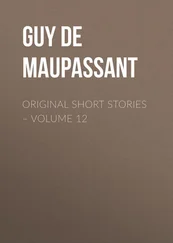"It certainly will be a fine celebration!"
It is going to a celebration; what Monsieur Patissot, Parisian bourgeois, calls a celebration; one of these nameless tumults which, for fifteen hours, roll from one end of the city to the other, every ugly specimen togged out in its finest, a mob of perspiring bodies, where side by side are tossed about the stout gossip bedecked in red, white and blue ribbons, grown fat behind her counter and panting from lack of breath, the rickety clerk with his wife and brat in tow, the laborer carrying his youngster astride his neck, the bewildered provincial with his foolish, dazed expression, the groom, barely shaved and still spreading the perfume of the stable. And the foreigners dressed like monkeys, English women like giraffes, the water–carrier, cleaned up for the occasion, and the innumerable phalanx of little bourgeois, inoffensive little people, amused at everything. All this crowding and pressing, the sweat and dust, and the turmoil, all these eddies of human flesh, trampling of corns beneath the feet of your neighbors, this city all topsy–turvy, these vile odors, these frantic efforts toward nothing, the breath of millions of people, all redolent of garlic, give to Monsieur Patissot all the joy which it is possible for his heart to hold.
After reading the proclamation of the mayor on the walls of his district he had made his preparations.
This bit of prose said:
I wish to call your attention particularly to the part of individuals in this celebration. Decorate your homes, illuminate your windows. Get together, open up a subscription in order to give to your houses and to your street a more brilliant and more artistic appearance than the neighboring houses and streets.
Then Monsieur Patissot tried to imagine how he could give to his home an artistic appearance.
One serious obstacle stood in the way. His only window looked out on a courtyard, a narrow, dark shaft, where only the rats could have seen his three Japanese lanterns.
He needed a public opening. He found it. On the first floor of his house lived a rich man, a nobleman and a royalist, whose coachman, also a reactionary, occupied a garret–room on the sixth floor, facing the street. Monsieur Patissot supposed that by paying (every conscience can be bought) he could obtain the use of the room for the day. He proposed five francs to this citizen of the whip for the use of his room from noon till midnight. The offer was immediately accepted.
Then he began to busy himself with the decorations. Three flags, four lanterns, was that enough to give to this box an artistic appearance—to express all the noble feelings of his soul? No; assuredly not! But, notwithstanding diligent search and nightly meditation, Monsieur Patissot could think of nothing else. He consulted his neighbors, who were surprised at the question; he questioned his colleagues—every one had bought lanterns and flags, some adding, for the occasion, red, white and blue bunting.
Then he began to rack his brains for some original idea. He frequented the cafes, questioning the patrons; they lacked imagination. Then one morning he went out on top of an omnibus. A respectable–looking gentleman was smoking a cigar beside him, a little farther away a laborer was smoking his pipe upside down, near the driver two rough fellows were joking, and clerks of every description were going to business for three cents.
Before the stores stacks of flags were resplendent under the rising sun. Patissot turned to his neighbor.
"It is going to be a fine celebration," he said. The gentleman looked at him sideways and answered in a haughty manner:
"That makes no difference to me!"
"You are not going to take part in it?" asked the surprised clerk. The other shook his head disdainfully and declared:
"They make me tired with their celebrations! Whose celebration is it? The government's? I do not recognize this government, monsieur!"
But Patissot, as government employee, took on his superior manner, and answered in a stern voice:
"Monsieur, the Republic is the government."
His neighbor was not in the least disturbed, and, pushing his hands down in his pockets, he exclaimed:
"Well, and what then? It makes no difference to me. Whether it's for the Republic or something else, I don't care! What I want, monsieur, is to know my government. I saw Charles X. and adhered to him, monsieur; I saw Louis–Philippe and adhered to him, monsieur; I saw Napoleon and adhered to him; but I have never seen the Republic."
Patissot, still serious, answered:
"The Republic, monsieur, is represented by its president!"
The other grumbled:
"Well, them, show him to me!"
Patissot shrugged his shoulders.
"Every one can see him; he's not shut up in a closet!"
Suddenly the fat man grew angry.
"Excuse me, monsieur, he cannot be seen. I have personally tried more than a hundred times, monsieur. I have posted myself near the Elysee; he did not come out. A passer–by informed me that he was playing billiards in the cafe opposite; I went to the cafe opposite; he was not there. I had been promised that he would go to Melun for the convention; I went to Melun, I did not see him. At last I became weary. I did not even see Monsieur Gambetta, and I do not know a single deputy."
He was, growing excited:
"A government, monsieur, is made to be seen; that's what it's there for, and for nothing else. One must be able to know that on such and such a day at such an hour the government will pass through such and such a street. Then one goes there and is satisfied."
Patissot, now calm, was enjoying his arguments.
"It is true," he said, "that it is agreeable to know the people by whom one is governed."
The gentleman continued more gently:
"Do you know how I would manage the celebration? Well, monsieur, I would have a procession of gilded cars, like the chariots used at the crowning of kings; in them I would parade all the members of the government, from the president to the deputies, throughout Paris all day long. In that manner, at least, every one would know by sight the personnel of the state."
But one of the toughs near the coachman turned around, exclaiming:
"And the fatted ox, where would you put him?"
A laugh ran round the two benches. Patissot understood the objection, and murmured:
"It might not perhaps be very dignified."
The gentleman thought the matter over and admitted it.
"Then," he said, "I would place them in view some place, so that every one could see them without going out of his way; on the Triumphal Arch at the Place de l'Etoile, for instance; and I would have the whole population pass before them. That would be very imposing."
Once more the tough turned round and said:
"You'd have to take telescopes to see their faces."
The gentleman did not answer; he continued:
"It's just like the presentation of the flags! There ought, to be some pretext, a mimic war ought to be organized, and the banners would be awarded to the troops as a reward. I had an idea about which I wrote to the minister; but he has not deigned to answer me. As the taking of the Bastille has been chosen for the date of the national celebration, a reproduction of this event might be made; there would be a pasteboard Bastille, fixed up by a scene–painter and concealing within its walls the whole Column of July. Then, monsieur, the troop would attack. That would be a magnificent spectacle as well as a lesson, to see the army itself overthrow the ramparts of tyranny. Then this Bastille would be set fire to and from the midst of the flames would appear the Column with the genius of Liberty, symbol of a new order and of the freedom of the people."
This time every one was listening to him and finding his idea excellent. An old gentleman exclaimed:
Читать дальше












